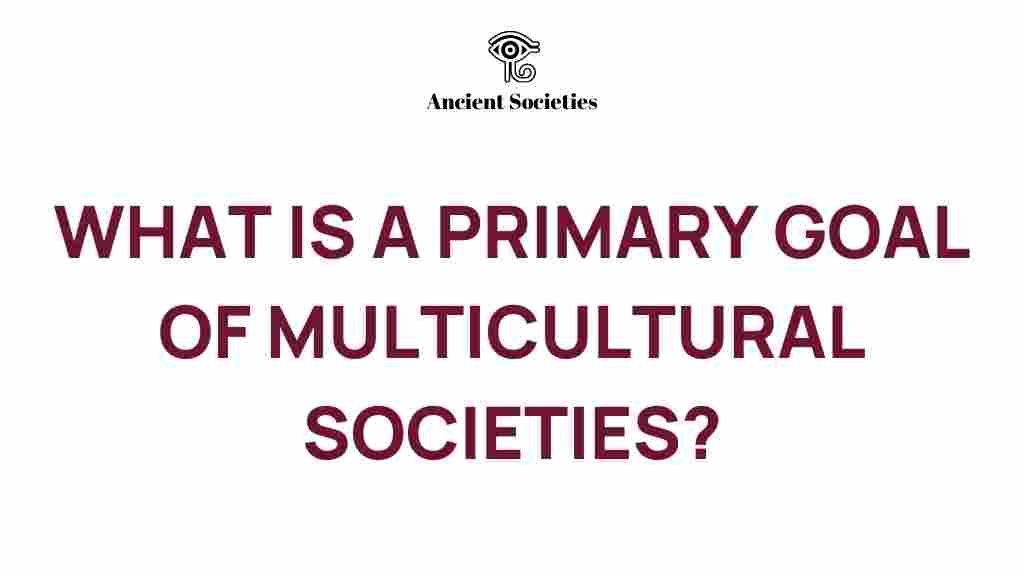Unpacking the Core Objectives of Multicultural Societies
Multicultural societies are increasingly becoming the norm in our globalized world. They represent a melting pot of cultural diversity, where different ethnic backgrounds, traditions, and beliefs coexist and contribute to a richer societal fabric. Understanding the core objectives of multicultural societies is essential for fostering social cohesion, integration, and community harmony. In this article, we will explore these objectives, highlighting the importance of inclusivity, shared values, and global citizenship in creating vibrant, successful multicultural environments.
Understanding Multicultural Societies
At the heart of multicultural societies lies cultural diversity. This diversity can be observed in various forms, including:
- Different languages
- Variety of religious beliefs
- Distinct customs and traditions
- Unique artistic expressions
The presence of such diversity enriches communities, fostering a dynamic exchange of ideas and experiences. However, it also presents challenges that need to be addressed to ensure the successful integration of various groups within a society.
The Core Objectives of Multicultural Societies
The following core objectives are vital for nurturing multicultural societies:
1. Promoting Social Cohesion
Social cohesion is fundamental in multicultural societies. It refers to the strength of relationships and the sense of belonging among individuals within a community. Here are some strategies to promote social cohesion:
- Encouraging community events that celebrate cultural diversity.
- Fostering dialogue between different cultural groups.
- Implementing policies that promote equal opportunities for all.
By enhancing social cohesion, multicultural societies can reduce tensions and build stronger relationships among their members.
2. Encouraging Integration
Integration is a crucial objective in multicultural societies. It involves not only the acceptance of diverse groups but also the active participation of these groups in societal activities. Effective integration can be achieved through:
- Providing language and vocational training for immigrants.
- Facilitating access to education and employment opportunities.
- Promoting cultural exchange programs.
These initiatives help individuals from various backgrounds feel valued and included in their communities.
3. Fostering Global Citizenship
Global citizenship is about understanding and embracing our shared humanity. In multicultural societies, fostering global citizenship encourages individuals to:
- Recognize their responsibilities towards others, regardless of cultural background.
- Engage in local and global issues that affect diverse communities.
- Promote sustainable practices that benefit all of humanity.
This mindset helps cultivate a sense of belonging that transcends national and cultural boundaries.
4. Building Community Harmony
Community harmony is essential for the peaceful coexistence of diverse groups. Achieving this harmony requires:
- Encouraging active participation in local governance.
- Creating safe spaces for dialogue and conflict resolution.
- Promoting volunteerism and community service initiatives.
Community harmony ensures that all voices are heard and respected, leading to a more unified society.
5. Emphasizing Inclusivity
Inclusivity is the cornerstone of multicultural societies. It involves creating environments where everyone feels welcome and valued. Key practices include:
- Implementing anti-discrimination policies.
- Ensuring representation of minority groups in decision-making processes.
- Providing resources and support for marginalized communities.
By emphasizing inclusivity, societies can harness the full potential of their diverse populations.
Shared values play a pivotal role in uniting individuals from different backgrounds. These values can include:
- Respect for human rights
- Commitment to justice and fairness
- Valuing education and lifelong learning
By promoting these shared values, multicultural societies can create a strong foundation for collaboration and mutual respect.
Addressing Challenges in Multicultural Societies
Despite the numerous benefits, multicultural societies often face challenges. Some common issues include:
- Discrimination and prejudice
- Language barriers
- Socioeconomic disparities
Addressing these challenges is essential for achieving the core objectives outlined above. Here are some troubleshooting tips:
1. Combating Discrimination
To combat discrimination, it is important for communities to:
- Educate individuals about cultural sensitivity and awareness.
- Implement strict anti-discrimination laws.
- Promote positive narratives around diversity in media.
2. Overcoming Language Barriers
Language barriers can hinder effective communication and integration. Communities can address this by:
- Offering language classes and resources.
- Encouraging bilingualism in schools and workplaces.
- Utilizing technology to facilitate translation services.
3. Addressing Socioeconomic Disparities
To tackle socioeconomic disparities, initiatives should focus on:
- Providing access to quality education and job training.
- Developing community programs that support low-income families.
- Encouraging local businesses to hire from diverse communities.
Conclusion
Multicultural societies are vital for fostering a more inclusive and harmonious world. By unpacking the core objectives of multicultural societies—social cohesion, integration, global citizenship, community harmony, inclusivity, and shared values—we can better understand how to navigate the complexities of cultural diversity. While challenges exist, proactive measures can pave the way for stronger communities that celebrate and embrace their differences.
As we move forward, it is essential to continue advocating for policies and practices that support multiculturalism. Doing so not only enhances the quality of life for individuals but also enriches society as a whole. For more insights on building inclusive communities, check out this resource.
Together, we can create a future where multicultural societies thrive, promoting peace and understanding across the globe.
This article is in the category Society and created by AncientSocieties Team
